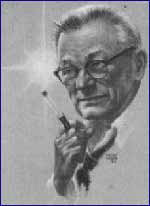
Exploring Tomorrow
1957 - 1958

Writer and editor John Campbell, Jr. hosted Exploring Tomorrow.
Exploring Tomorrow was hosted by John Campbell, the editor of Astounding Science Fiction Magazine, and later, Analog Magazine. He was also a science fiction writer himself, and penned the short story, Who Goes There?, which was later made into the 1950s classic monster movie, The Thing. So Campbell certainly had the Sci-Fi credentials . Exploring Tomorrow was billed as "The first science fiction radio show of science-fictioneers, by science-fictioneers, for science-fictioneers." (Otrcat.com) Each week, Campbell would open and close the story by making philosophical observations about how the technology featured in that night's story might affect mankind. These serious comments were meant to be deep and thoughtful, but the effect was undercut by the choice of elevator background music. (Like a Musak rendition of "As Time Goes By," complete with muted trumpet and syrupy violins.) It leaves the impression that this is a series that takes itself way too seriously! Yet despite this one rather dated aspect, the program is still quite enjoyable to listen to. It comes across as a poor man's version of X Minus One. Science fiction fans will find it fun exploring yesterday's vision of the future by Exploring Tomorrow!
Each story was usually built around a fantastic "what if" concept, like time travel or robots. Artist depiction courtesy of Tune In For Terror © 1992
The Standard Intro:
Host: "The program you are about to hear is fiction, science fiction. We make no guarantees, however, how long it will remain fiction."
(SFX: Echo voice:) "Exploring Tomorrow!"
(SFX: Music: Similar to ABC's Wide World of Sports.)
Announcer: "And now, here's your guide into these adventures in the mind... the editor of Astounding Science Fiction magazine, John Campbell, Jr."
An Opening Narration:
Host: "When men start a new project, it starts with a plan. The plan has to be carried out, worked though, the details arranged for. You don't have any trouble until the thing you did not expect turns up. So far, human research has achieved an unmanned satellite in space. The sole purpose of any of these devices, any machine, is to serve human beings. The machine goes first to try things out. But the sole purpose of doing it is so men can follow. And women too. But there are problems of purely human nature that sometimes complicate the most scientific of plans."
A Middle Narration:
Host: "Alice had called attention to the fact that the space station had not been adequately designed. It had been designed alright to take care of men, and of women. But taking care of human individuals is not enough if we are to really enter the space age. We have to take care of the human race. That's something Alice was bringing to attention."
An Ending Narration:
Host: "There's the impression that science fiction has to do with machines, all about gadgets and ray guns. It isn't. That's why it's science fiction. It has to do with human beings and the problems human beings will have with the machines we do and must live with. And if the machines aren't properly designed to recognize that their purpose is to serve humanity, they're no good either."
(Announcer reads credits.)
Lawson Zerbe starred on numerous radio programs, including Exploring Tomorrow and Murder at Midnight.
Hear it now, FREE!
Hear up to 9 different episodes of Exploring Tomorrow in RealPlayer!
(RealPlayer allows you to continue to browse other sites while you listen.)
Or hear episodes streaming on OldTimeRadioDownloads.com
OTR Plot Spot synopsis for various episodes from Exploring Tomorrow:
http://www.otrplotspot.com/ExploringTomorrow.htm
Rev. 7.1.18. © 2007 Monsterwax Sci-fi & Horror Monster Cards